MLK: How He Convinced Nichelle Nichols Not To Quit ‘Star Trek’
Dr. Martin Luther King Jr. had a big influence on Star Trek‘s original series, which ran from 1966-1969. In fact, he convinced Nichelle Nichols to not quit her role as Lt….

LOS ANGELES, CA – OCTOBER 01: Nichelle Nichols attends the Ovation TV premiere screening of “Art Breakers” on October 1, 2015 in Los Angeles, California.
(Photo by Araya Diaz/Getty Images for Ovation)Dr. Martin Luther King Jr. had a big influence on Star Trek's original series, which ran from 1966-1969. In fact, he convinced Nichelle Nichols to not quit her role as Lt. Nyota Uhura on Star Trek.
In an 2011 interview with StarTrek.com, Nichols recounted the time that Dr. King convinced her to rescind the resignation letter she'd given to Trek creator Gene Roddenberry.
"When I told Gene [Roddenberry], I walked away, and as far as I was concerned it was a fait accompli," she said. "Remember, I grew up in musical theater. I belonged to the theater, not to television or movies. Those were things I did when I hadn’t quite made it where I wanted to go, but was on my way. I had quite a lot going for me. I had no idea of the power of being on a screen and people seeing you weekly. But I was ready to go. As nice as this little part was, and I loved the people and I loved working on it, and I was getting experience in a new medium, I didn’t think twice about [leaving]."
Later in the interview, Nichols recounts attending an event where Dr. King told her he was her biggest fan. "One of the organizers of the event came over to me and said, 'Ms. Nichols, I hate to bother you just as you’re sitting down to dinner, but there’s someone here who wants very much to meet you. And he said to tell you that he is your biggest fan,'" Nichols said. "I said, 'Oh, certainly,' I stood up and turned around and who comes walking over towards me from about 10 or 15 feet, smiling that rare smile of his, is Dr. Martin Luther King. I remember saying to myself, 'Whoever that fan is, whoever that Trekkie is, it’ll have to wait because I have to meet Dr. Martin Luther King.' And he walks up to me and says, 'Yes, Ms. Nichols, I am your greatest fan.' I was so stunned."
He told Nichols how much the show meant to him personally and how it was the only show he and his Coretta would let their kids stay up to watch. After all the praise, Nichols had to tell Dr. King that she was leaving the show.
"He said, 'What are you talking about?'" the actress explained. "I told him. He said, 'You cannot.' He said, 'Don’t you see what this man [Star Trek creator Gene Roddenberry] is doing, who has written this? This is the future. He has established us as we should be seen. Three hundred years from now, we are here. We are marching. And this is the first step. When we see you, we see ourselves, and we see ourselves as intelligent and beautiful and proud.' He goes on and I’m looking at him and my knees are buckling. I said, 'I…, I…' And he said, 'You turn on your television and the news comes on and you see us marching and peaceful, you see the peaceful civil disobedience, and you see the dogs and see the fire hoses, and we all know they cannot destroy us because we are there in the 23rd century.'
Right then and there Nichols was convinced to go and get her job back.
"That’s all it took," she continued. "I went back on Monday morning and told Gene what had happened. He sat there behind that desk and a tear came down his face, and he looked up at me. I said, 'Gene, if you want me to stay, I will stay. There’s nothing I can do but stay.' He looked at me and said, 'God bless Dr. Martin Luther King. Somebody truly knows what I am trying to do.' [Roddenberry] opened his drawer, took out my resignation and handed it to me. He had torn it to pieces. He handed me the 100 pieces and said, 'Welcome back.'”
5 Dr. Martin Luther King Jr. Quotes You Can’t Whitewash
For decades, Dr. Martin Luther King Jr.'s speeches have been analyzed, critiqued, and studied but what has been detrimental to those uplifting orations are that only parts of his words are being used to create a simple-minded perspective of the entirety of his vision. The phrases "peaceful protest" and "nonviolence" are indeed a common thread throughout his teachings and practices but not the only ones Dr. King had. After his death in 1968, the retelling of his vision has been lost in translation and has been reduced to only his most popular speech "I Have A Dream."
Here we will unearth the quotes that can not be "whitewashed" or "toned down."
1.
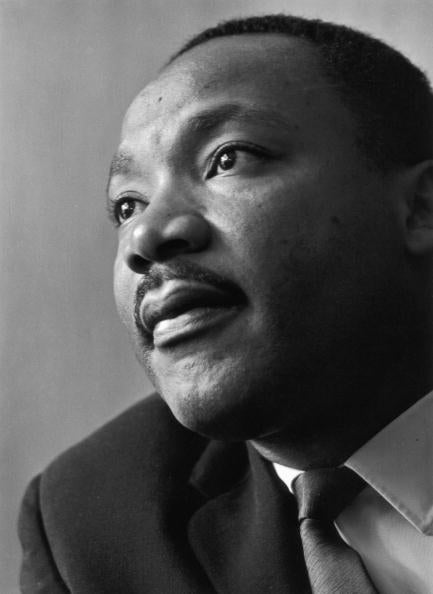 (Photo by Reg Lancaster/Express/Getty Images)
(Photo by Reg Lancaster/Express/Getty Images)“A nation that continues year after year to spend more money on military defense than on programs of social uplift is approaching spiritual death.” —A Time to Break the Silence: April 4, 1967
2.
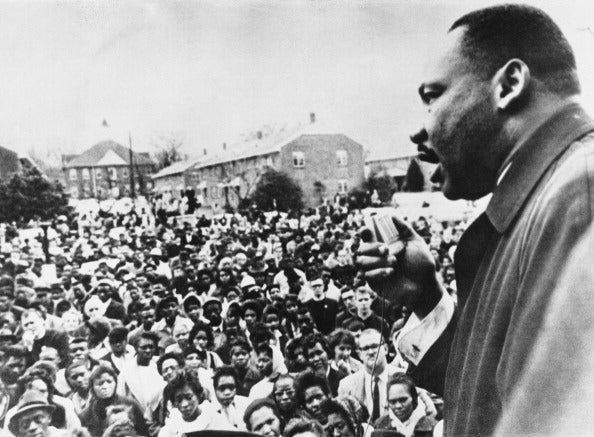 (Photo by Keystone/Getty Images)
(Photo by Keystone/Getty Images)“…the price that America must pay for the continued oppression of the Negro and other minority groups is the price of its own destruction.” —The American Dream: July 4, 1965
3.
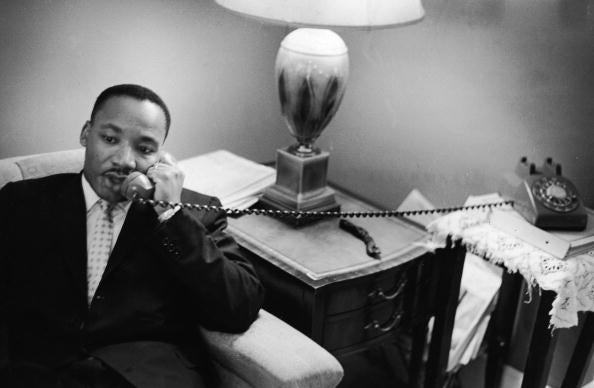 (Photo by Express Newspapers/Getty Images)
(Photo by Express Newspapers/Getty Images)“White Americans must recognize that justice for Black people cannot be achieved without radical changes in the structure of our society.” —Where Do We Go from Here? 1967
4.
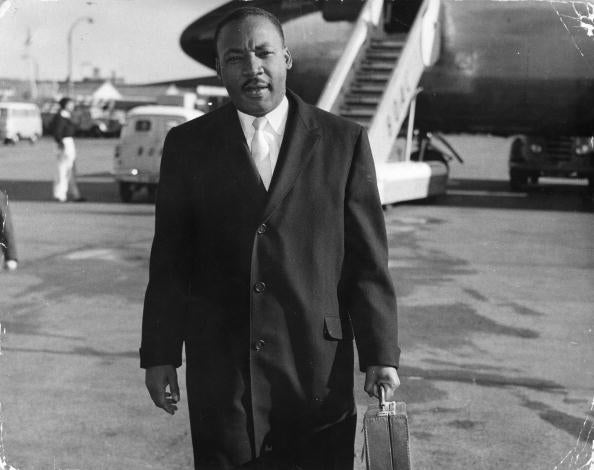 (Photo by J. Wilds/Keystone/Getty Images)
(Photo by J. Wilds/Keystone/Getty Images)The evils of capitalism are as real as the evils of militarism and racism. The problems of racial injustice and economic injustice cannot be solved without a radical redistribution of political and economic power. - King to the Southern Christian Leadership Conference (SCLC) board on March 30, 1967.
5.
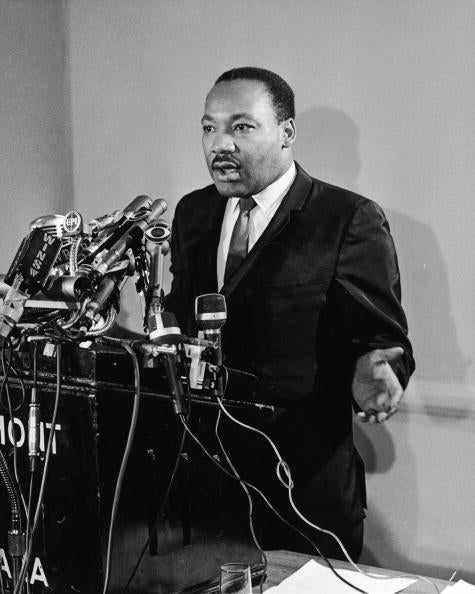 (Photo by John Goodwin/Getty Images)
(Photo by John Goodwin/Getty Images)"But it is not enough for me to stand before you tonight and condemn riots. It would be morally irresponsible for me to do that without, at the same time, condemning the contingent, intolerable conditions that exist in our society. These conditions are the things that cause individuals to feel that they have no other alternative than to engage in violent rebellions to get attention. And I must say tonight that a riot is the language of the unheard. And what is it America has failed to hear?...It has failed to hear that the promises of freedom and justice have not been met. And it has failed to hear that large segments of white society are more concerned about tranquility and the status quo than about justice and humanity." — “The other America,” 1968







